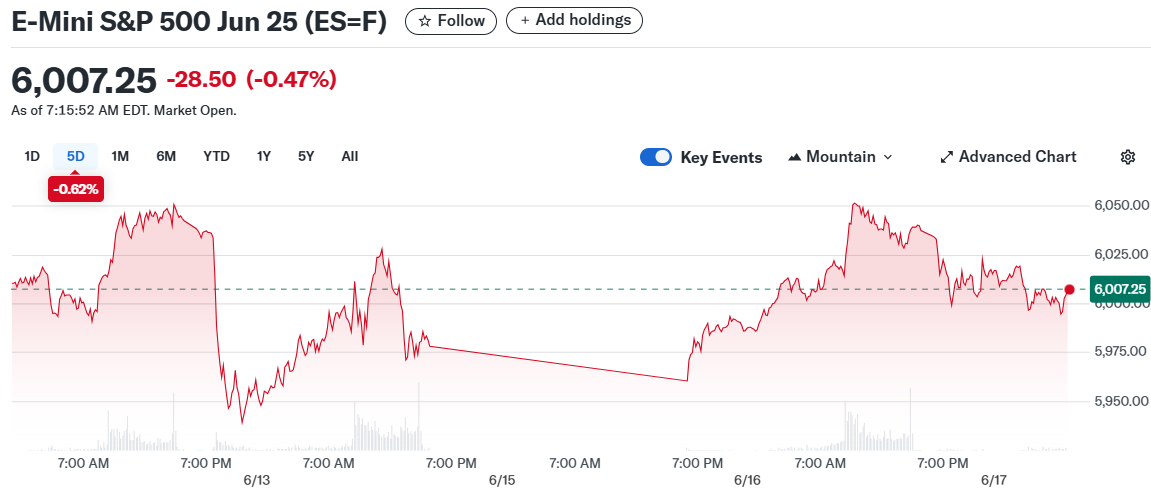TLDR
- Trump left the G-7 summit early to focus on the Israel-Iran conflict, rejecting ceasefire talks in favor of “a real end” to the nuclear dispute
- Israel and Iran continued strikes for a fifth consecutive day, with Israel claiming reduced Iranian missile fire after targeting weapons depots
- Israeli Oil Refineries Ltd. shut down operations after damage killed three employees, affecting 200,000 barrels per day production capacity
- Wall Street futures dropped 0.6% as the Middle East conflict entered its fifth day, with energy stocks rising on elevated oil prices
- Senate Republicans unveiled tax bill changes that phase out solar and wind credits by 2028 while extending nuclear energy credits to 2036
President Donald Trump departed the Group of Seven summit in Canada early on Tuesday to address escalating Middle East tensions. He dismissed prospects for a ceasefire between Israel and Iran, instead calling for “a real end” to the nuclear dispute.
"Iran should have signed the “deal” I told them to sign. What a shame, and waste of human life. Simply stated, IRAN CAN NOT HAVE A NUCLEAR WEAPON. I said it over and over again! Everyone should immediately evacuate Tehran!" –President Donald J. Trump pic.twitter.com/oniUSgsMWA
— The White House (@WhiteHouse) June 16, 2025
Speaking to reporters aboard Air Force One, Trump explained his position clearly. “An end. A real end. Not a ceasefire. An end,” the president stated when asked about his goals for resolving the conflict.
The president has not outlined specific next steps for ending the crisis. He suggested he might send a high-level official such as Middle East envoy Steven Witkoff or Vice President JD Vance to meet with Iran, but added this “depends what happens when I get back.”
Trump expressed frustration with Iran’s previous negotiation efforts. “I told them to do the deal, they should have done the deal,” he said, adding he’s “not too much in the mood to negotiate.”
The conflict entered its fifth consecutive day with continued strikes between both nations. Israeli military spokesperson Nadav Shoshani reported a decrease in Iranian missile attacks, with “a few dozen” launched since midnight compared to hundreds over the weekend.
Israel credited a 48-hour campaign targeting Iranian missile depots and launchers for reducing incoming attacks. “We are intercepting them in Iran, now, rather than in our skies,” Shoshani told CNN.
Economic Impact Spreads
The violence has created real economic consequences in both countries. Israeli Oil Refineries Ltd. announced it shut down operations after the complex sustained damage that killed three employees on Monday.
The facility has peak production capacity of nearly 200,000 barrels per day. About 70% of its products serve the Israeli domestic market, according to company information.
Iranian government sources report more than 200 people killed by Israeli strikes. Israeli officials count 24 deaths and over 600 injuries from Iranian attacks.
Israeli Defense Forces spokesperson Effie Defrin said strikes on Iran’s nuclear facilities are “deepening” every day. Israel has achieved air superiority over much of Iran, allowing bombardment of major cities and infrastructure.
Market Response
U.S. stock futures fell Tuesday morning as the conflict dampened investor confidence. Dow E-minis dropped 269 points or 0.63%, while S&P 500 E-minis declined 37.25 points or 0.62%.

Energy stocks bucked the downward trend with oil prices remaining elevated. Chevron and Exxon shares each rose nearly 1% in premarket trading.
The USS Nimitz aircraft carrier strike group is sailing to the Middle East ahead of schedule. This marks the first major movement of American military assets to the region since fighting began Friday.
Senate Republicans unveiled changes to Trump’s tax legislation that could affect energy markets. The proposed bill phases out solar and wind tax credits by 2028 while extending nuclear energy credits to 2036.
Solar stocks fell sharply on the news, with Sunrun dropping 27.5% and SolarEdge Technologies declining more than 21.6%. Nuclear power companies gained, with Oklo up 1.9% and Nano Nuclear Energy rising 2.2%.
Iran’s President Masoud Pezeshkian told Turkish President Recep Tayyip Erdogan that Iran will respond with “proportional retaliation” to Israeli strikes. The Federal Reserve’s policy meeting Wednesday adds another layer of uncertainty for markets already stressed by geopolitical events.






